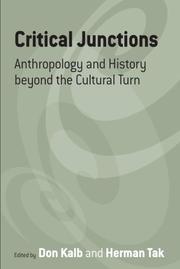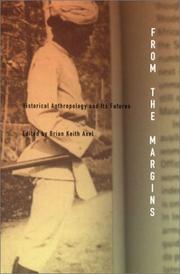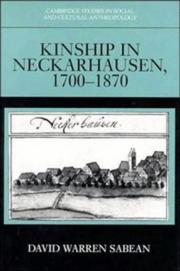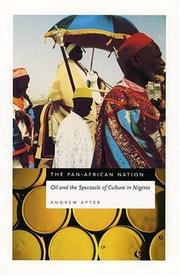| Listing 1 - 9 of 9 |
Sort by
|

ISBN: 1845450086 1845450299 1782389628 Year: 2005 Publisher: New York, N.Y. Berghahn
Abstract | Keywords | Export | Availability | Bookmark
 Loading...
Loading...Choose an application
- Reference Manager
- EndNote
- RefWorks (Direct export to RefWorks)
The “cultural turn” has been a multifarious and pervasive phenomenon in Western universities and modes of social knowledge since the early 1980s. This volume focuses on the conjunction of two disciplines where both the analytic promises as well as the difficulties involved in the meeting of humanist and social science approaches soon became obvious. Anthropologists and historians have come together here in order to recapture, elaborate, and criticize pre-Cultural Turn and non-Cultural Turn modes of analysing structures of experience, feeling, subjectivity and action in human societies and to highlight the still unexploited possibilities developed among others in the work of scholars such as Norbert Elias, Max Gluckman, Eric Wolf, E.P. Thompson and Raymond Williams.
Ethnology. Cultural anthropology --- History as a science --- Anthropology --- Ethnohistory. --- Historiography. --- Methodology. --- Ethnohistory --- Historiography --- Historical criticism --- History --- Authorship --- Ethnohistorical method --- Historical anthropology --- Historical ethnology --- Ethnology --- Methodology --- Criticism
Book
ISBN: 9004280642 9789004280649 9004277498 9789004277496 9789004277496 1322237182 Year: 2015 Publisher: Leiden Brill
Abstract | Keywords | Export | Availability | Bookmark
 Loading...
Loading...Choose an application
- Reference Manager
- EndNote
- RefWorks (Direct export to RefWorks)
In The Mongol Empire between Myth and Reality , Denise Aigle presents the Mongol empire as a moment of contact between political ideologies, religions, cultures and languages, and, in terms of reciprocal representations, between the Far East, the Muslim East, and the Latin West. The first part is devoted to “The memoria of the Mongols in historical and literary sources” in which she examines how the Mongol rulers were perceived by the peoples with whom they were in contact. In “Shamanism and Islam” she studies the perception of shamanism by Muslim authors and their attempts to integrate Genghis Khan and his successors into an Islamic framework. The last sections deal with geopolitical questions involving the Ilkhans, the Mamluks, and the Latin West. Genghis Khan’s successors claimed the protection of “Eternal Heaven” to justify their conquests even after their Islamization.
Mongols --- Ethnohistory --- Ethnohistorical method --- Historical anthropology --- Historical ethnology --- Anthropology --- Ethnology --- History --- Methodology --- Mongoles --- Ethnohistoire --- Histoire --- History of Asia --- anno 1100-1199 --- anno 1200-1299 --- anno 1300-1399 --- Ethnohistory. --- Mongols. --- To 1500. --- Asia.
Periodical
ISSN: 09428704 21944032 Year: 1993 Publisher: Göttingen Vandenhoeck & Ruprecht
Abstract | Keywords | Export | Availability | Bookmark
 Loading...
Loading...Choose an application
- Reference Manager
- EndNote
- RefWorks (Direct export to RefWorks)
Diversity and inconsistency of historical practice with which people try to understand the world are the focus of the journal "Historische Anthropologie". Constitutions and attitudes, interpretations, imaginations and behaviour are analysed and presented within their historical and social references. "Historische Anthropologie" offers a forum for scientific discussion of up-to-date topics and new approaches to history from the antiquity to the present.
History --- Ethnology. Cultural anthropology --- Ethnology --- Social history --- Anthropologie sociale et culturelle --- Histoire sociale --- Periodicals --- Périodiques --- Ethnohistory --- Ethnohistory. --- Social history. --- Social Sciences --- Anthropology --- #VCV tijdschrift abonnement --- Périodiques --- Descriptive sociology --- Ethnohistorical method --- Historical anthropology --- Historical ethnology --- Cultural anthropology --- Ethnography --- Races of man --- Social anthropology --- Sociology --- Human beings --- Methodology
Book
ISBN: 9780754667506 0754667502 9781315255637 9781351937627 9781138631151 Year: 2010 Publisher: Aldershot [etc.] Ashgate
Abstract | Keywords | Export | Availability | Bookmark
 Loading...
Loading...Choose an application
- Reference Manager
- EndNote
- RefWorks (Direct export to RefWorks)
History of civilization --- Europe --- Cultuurgeschiedenis. --- Civilization, Western --- Ethnohistory. --- Art --- Civilisation occidentale --- Ethnohistoire --- History. --- Histoire --- Burke, Peter --- Influence. --- Festschrift - Libri Amicorum --- Ethnohistory --- Ethnohistorical method --- Historical anthropology --- Historical ethnology --- Anthropology --- Ethnology --- History --- Methodology --- Burke, Peter, --- Burke, Ulick Peter, --- ピーター・バーク, --- 勃克, --- Art history --- History of art --- Mélanges et hommages --- Mélanges et hommages

ISBN: 0822328615 0822328887 0822383349 1283063158 9786613063151 Year: 2002 Publisher: Durham, N.C. Duke University Press
Abstract | Keywords | Export | Availability | Bookmark
 Loading...
Loading...Choose an application
- Reference Manager
- EndNote
- RefWorks (Direct export to RefWorks)
History as a science --- #SBIB:39A3 --- Antropologie: geschiedenis, theorie, wetenschap (incl. grondleggers van de antropologie als wetenschap) --- Colonies. --- Ethnohistory. --- Postcolonialism. --- Social history. --- Colonies --- Ethnohistory --- Postcolonialism --- Social history --- Descriptive sociology --- Social conditions --- Post-colonialism --- Postcolonial theory --- Ethnohistorical method --- Historical anthropology --- Historical ethnology --- Anti-colonialism --- Colonial affairs --- Colonialism --- Neocolonialism --- History --- Sociology --- Political science --- Decolonization --- Anthropology --- Ethnology --- Imperialism --- Non-self-governing territories --- Colonization --- Methodology
Book
ISBN: 3631655010 9783631655016 9783653047974 9783631708583 9783631708590 3631708580 3653047978 Year: 2019 Volume: 20 Publisher: Berlin: Lang,
Abstract | Keywords | Export | Availability | Bookmark
 Loading...
Loading...Choose an application
- Reference Manager
- EndNote
- RefWorks (Direct export to RefWorks)
The book presents a theory of relationship between the forms of devotion and early drama genres. The historical background is the circumstances of the Church becoming independent of the Empire. A theological and philosophical aspect of the transformation of piety at the time was the specification of the ontological status of the sacred (spiritualization) and "shifting it to Heaven" (transcendentalization). In opposition to a theory of Western civilization as a process of increasing individual self-control, the author argues for the need to take into account purely religious conditions (the idea of recapitulation). This allows the author to develop a holistic aesthetics for the religiously inspired creativity in the period spanning the 11th-15th centuries and to propose a new typology of medieval drama.
Theater --- Religious aspects --- Christianity --- Christian religion --- Theatrical science --- anno 500-1499 --- Drama, Medieval --- History and criticism. --- Theater - Religious aspects - Christianity --- 2013 --- Ages --- Art History --- Cognitive Psychology --- cywilizacja --- Dabrowka --- estetyka --- Historical Anthropology --- Medieval Drama --- Middle --- Monografie --- Religia --- Religion and Civilization --- Sacred --- sacrum --- seria --- Social History --- średniowieczu --- Teatr --- Theatre --- Torun --- Wydawnictwo
Periodical
ISSN: 00141801 15275477 Year: 1954 Publisher: Durham (N.C.): Duke university press,
Abstract | Keywords | Export | Availability | Bookmark
 Loading...
Loading...Choose an application
- Reference Manager
- EndNote
- RefWorks (Direct export to RefWorks)
Ethnohistory emphasizes the joint use of documentary materials and ethnographic or archaeological data, as well as the combination of historical and anthropological approaches, in the study of social and cultural processes and history. The journal has established a strong reputation for its studies of the history of native peoples in the Americas and in recent years has expanded its focus to cultures and societies throughout the world. Ethnohistory publishes articles, review essays, and book reviews by scholars in anthropology, history, archaeology, linguistics, literature and art history, geography, and other disciplines and is read by historians and anthropologists alike.
Ethnology. Cultural anthropology --- Indians of North America --- Indians --- Indiens d'Amérique --- Periodicals. --- Périodiques --- Ethnohistory --- Ethnohistory. --- Indians. --- Indians of North America. --- Ohio River Valley. --- Arts and Humanities --- Social Sciences --- History --- Society and Culture --- Anthropology --- Ethnohistorical method --- Historical anthropology --- Historical ethnology --- Ethnology --- American aborigines --- American Indians --- First Nations (North America) --- Indians of the United States --- Native Americans --- North American Indians --- Aborigines, American --- Amerindians --- Amerinds --- Pre-Columbian Indians --- Precolumbian Indians --- Indigenous peoples --- Methodology --- Industries --- Civilization --- Culture --- Ohio Valley --- United States --- Indianie --- Indians - Ohio River Valley - Periodicals. --- Indians of North America - Periodicals. --- Indians - Periodicals. --- Ethnohistory - Periodicals.

ISBN: 0521586577 0521583810 0511572565 Year: 1998 Publisher: Cambridge : Cambridge University Press,
Abstract | Keywords | Export | Availability | Bookmark
 Loading...
Loading...Choose an application
- Reference Manager
- EndNote
- RefWorks (Direct export to RefWorks)
This work analyses shifts in the relations of families, households, and individuals in a single German village during the transition to a modern social structure and cultural order. The findings call into question the idea that the more modern society became, the less kin mattered. Rather, the opposite happened. During 'modernization', close kin developed a flexible set of exchanges, passing marriage partners, godparents, political favors, work contacts, and financial guarantees back and forth. Sabean also argues that the new kinship systems were fundamental for class formation, and he repositions women in the center of a political culture of alliance construction. One of a series of important local studies coming out of the Max Planck Institute for History, it is the most thorough-going attempt to work between the disciplines of social and cultural history and anthropology, and it demonstrates the power of microhistory to reconceptualize general historical trends.
#SBIB:316.356.2H1120 --- Gezinssociologie: historische studies over het gezin voor 1900 --- Ethnohistory --- Families --- Kinship --- History of Germany and Austria --- anno 1700-1799 --- anno 1800-1899 --- Nürtingen --- Ethnology --- Clans --- Consanguinity --- Kin recognition --- Family --- Family life --- Family relationships --- Family structure --- Relationships, Family --- Structure, Family --- Social institutions --- Birth order --- Domestic relations --- Home --- Households --- Marriage --- Matriarchy --- Parenthood --- Patriarchy --- Ethnohistorical method --- Historical anthropology --- Historical ethnology --- Anthropology --- Social aspects --- Social conditions --- Methodology --- Neckarhausen (Nürtingen, Germany) --- Social life and customs. --- Arts and Humanities --- History --- ALLEMAGNE --- FAMILLES --- CONDITIONS SOCIALES --- 18E-19E SIECLES --- HISTOIRE

ISBN: 0226023540 0226023559 9780226023557 9786612426087 1282426087 0226023567 9780226023564 9780226023540 9781282426085 661242608X Year: 2005 Publisher: Chicago, Ill. University of Chicago Press
Abstract | Keywords | Export | Availability | Bookmark
 Loading...
Loading...Choose an application
- Reference Manager
- EndNote
- RefWorks (Direct export to RefWorks)
When Nigeria hosted the Second World Black and African Festival of Arts and Culture (FESTAC) in 1977, it celebrated a global vision of black nationhood and citizenship animated by the exuberance of its recent oil boom. Andrew Apter's The Pan-African Nation tells the full story of this cultural extravaganza, from Nigeria's spectacular rebirth as a rapidly developing petro-state to its dramatic demise when the boom went bust. According to Apter, FESTAC expanded the horizons of blackness in Nigeria to mirror the global circuits of its economy. By showcasing masks, dances, images, and souvenirs from its many diverse ethnic groups, Nigeria forged a new national culture. In the grandeur of this oil-fed confidence, the nation subsumed all black and African cultures within its empire of cultural signs and erased its colonial legacies from collective memory. As the oil economy collapsed, however, cultural signs became unstable, contributing to rampant violence and dissimulation. The Pan-African Nation unpacks FESTAC as a historically situated mirror of production in Nigeria. More broadly, it points towards a critique of the political economy of the sign in postcolonial Africa.
Industrial economics --- Nigeria --- Petroleum industry and trade --- Revenue --- Pétrole --- Revenus de l'Etat --- Industrie et commerce --- World Black and African Festival of Arts and Culture --- Africa --- Afrique --- Cultural policy. --- Civilization. --- Politique culturelle --- Civilisation --- #SBIB:39A5 --- #SBIB:39A73 --- Government revenue --- Public revenue --- Finance, Public --- Taxation --- Kunst, habitat, materiële cultuur en ontspanning --- Etnografie: Afrika --- Africa -- Civilization. --- Nigeria - Cultural policy. --- Nigeria -- Cultural policy. --- Petroleum industry and trade - Nigeria. --- Petroleum industry and trade -- Nigeria. --- Revenue - Nigeria. --- Revenue -- Nigeria. --- World Black and African Festival of Arts and Culture (2nd : 1977 : Lagos, Nigeria). --- Business & Economics --- Industries --- Pétrole --- Nigeria (Federation) --- Federation of Nigeria --- Nigerija --- Federal Republic of Nigeria --- Colony and Protectorate of Nigeria --- Republic of Nigeria --- Federal Military Government (Nigeria) --- Nai-chi-li-ya --- Nigerii︠a︡ --- Bundesrepublik Nigeria --- Jamhuriyar Taraiyar Nijeriya --- Ọ̀hàńjíkọ̀ Ọ̀hànézè Naìjíríyà --- Orílẹ̀-èdè Olómìniira Àpapọ̀ Nàìjíríà --- ナイジェリア --- Naijeria --- ניגריה --- Nigeryah --- FESTAC --- nigeria, nigerian, africa, african, oil, natural resources, spectacle, nation, state, history, historical, anthropology, global vision, transnational, international, black nationhood, citizenship, cultural studies, culture, economy, economics, violence, postcolonial, postcolonialism, impacts of colonialism, civilization, petroleum, revenue, profit, industry, trade, festival, world, arts, lagos, politics, dissimulation. --- Social policy.
| Listing 1 - 9 of 9 |
Sort by
|

 Search
Search Feedback
Feedback About UniCat
About UniCat  Help
Help News
News